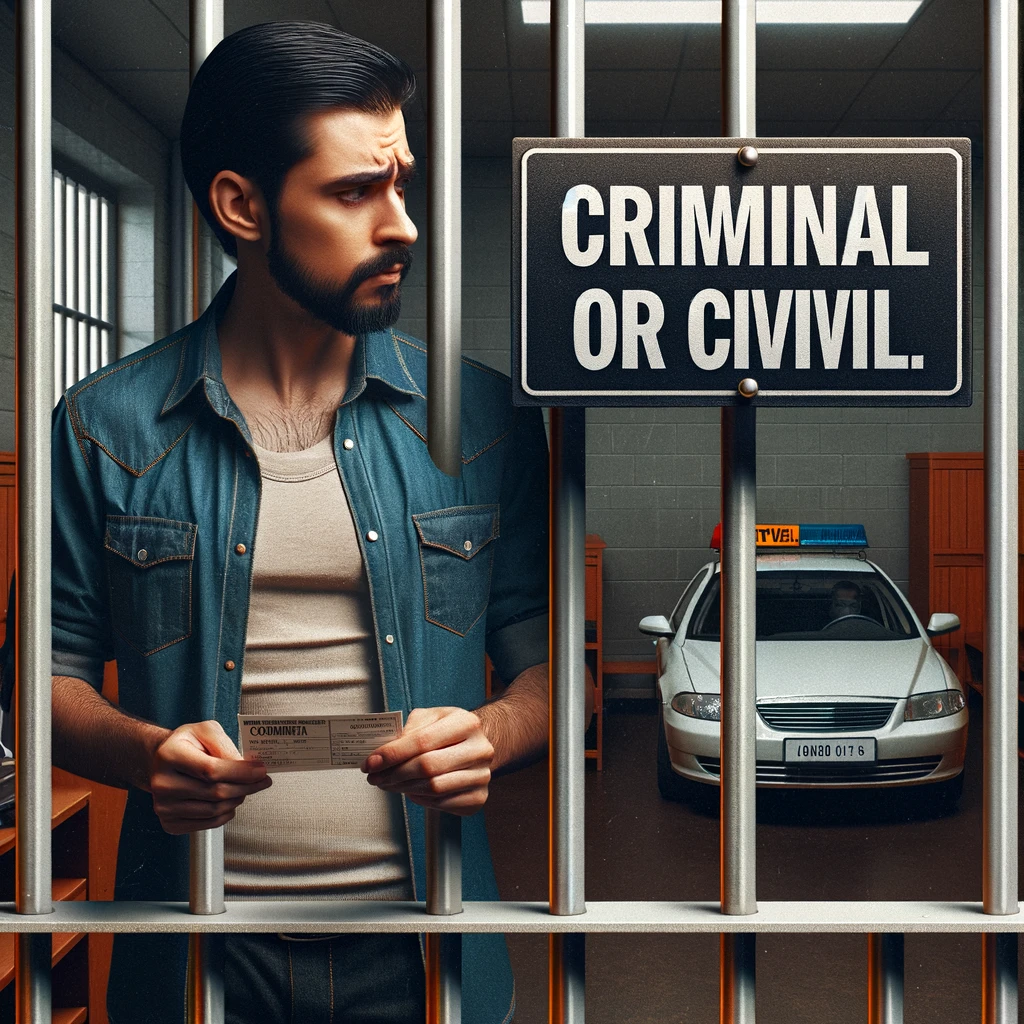When you see those flashing lights in your rearview mirror, or receive a traffic ticket in the mail, it’s natural to wonder about the nature of the offense. Are traffic violations considered criminal, or are they civil infractions? This article explores the distinctions between these two categories, helping you understand what a traffic violation could mean for you.
What Are Traffic Violations?

Traffic violations occur when drivers break laws that regulate vehicle operation on public roads. These laws are designed to ensure safety and smooth traffic flow. Common traffic violations include speeding, running a red light, not using turn signals, and driving under the influence of alcohol or drugs.
How Are Traffic Violations Classified?
Civil Traffic Violations
Most traffic violations are civil infractions. This means they are not deemed to seriously endanger public safety. Examples include minor speeding, failing to stop at a stop sign, or not wearing a seatbelt. Civil violations typically result in a fine, and they do not appear on a criminal record. However, accumulating too many civil infractions can lead to more severe penalties like license suspension.
Criminal Traffic Violations
Criminal traffic violations are considered more severe. These include driving under the influence (DUI), hit and run, reckless driving, and vehicular manslaughter. Criminal offenses can lead to significant fines, court appearances, or even imprisonment. They are entered into your criminal record, which can impact future employment opportunities and other areas of your life.
What Are the Consequences of Each Type?
Civil traffic violations usually result in a fine and may affect insurance rates. In some cases, you might be required to attend traffic school. On the other hand, criminal traffic offenses can lead to more severe legal consequences, including jail time, probation, and hefty fines. Both types can lead to points on your driving record, which can affect your driving privileges.
How Can You Respond to a Traffic Violation?
If you receive a Traffic ticket whether you live in New Jersey or any other state in America., it’s important to read it carefully to understand whether it’s a civil infraction or a criminal offense. For civil infractions, you typically have the option to pay the fine or contest the ticket in court. For criminal violations, it is advisable to consult with a lawyer due to the seriousness of the charges.
Why Should You Understand the Difference?
Understanding whether a traffic violation is criminal or civil can help you respond appropriately. Knowing the potential consequences can also motivate drivers to adhere more closely to traffic laws, thus ensuring their safety and the safety of others on the road.
Can Traffic Violations Impact Your Employment?
In some cases, yes, especially if the violation is criminal. Here’s how traffic violations might affect your job prospects:
- Background Checks: Many employers conduct background checks that include driving records, particularly for positions that require driving.
- Professional Licenses: Certain professions may require a clean driving record. Criminal traffic violations can jeopardize professional licenses in fields like law enforcement, teaching, or commercial driving.
- Insurance Costs: Employers might hesitate to hire someone with a poor driving record for roles that involve driving, due to higher insurance premiums.
How Can You Avoid Traffic Violations?
Avoiding traffic violations not only keeps your record clean but also contributes to safer roads. Here are some tips:
- Stay Informed: Keep up with changes in traffic laws, especially when moving to a new area or state.
- Plan Ahead: Allow ample time for travel to avoid the temptation of speeding.
- Avoid Distractions: Keep your focus on the road. Do not text, eat, or engage in other activities that could divert your attention.
- Maintain Your Vehicle: Ensure your vehicle is in good working order. Check lights, brakes, and tires regularly.
What Should You Do If You Disagree with a Traffic Violation?
If you believe a traffic violation you’ve been charged with is unjust, you have options:
- Contest the Ticket in Court: You can appear in court on the assigned date and present your case. It’s advisable to bring any evidence or witnesses that support your claim.
- Hire an Attorney: For more serious charges or if you’re unsure how to proceed, consulting with an attorney can be beneficial.
- Attend Defensive Driving Courses: Sometimes, attending these courses can help reduce the penalties or dismiss the violation, depending on the jurisdiction.
Conclusion
While most traffic violations are civil and relatively minor, it’s crucial to understand the differences and implications of each type. By staying informed, you can better navigate the legal repercussions and take steps to maintain a clean driving record. Always remember, safe driving not only helps avoid legal troubles but also protects lives.
Common FAQs
Can a traffic ticket affect my credit score?
No, traffic tickets do not directly affect your credit score.
Is a parking violation a criminal offense?
No, parking violations are generally considered civil infractions.
Can I get a traffic violation expunged?
Yes, some traffic violations can be expunged, depending on state laws and the nature of the offense.